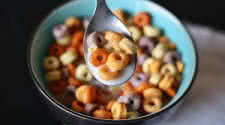Carbohydrates & Exercise

Advanced Exercise & Nutritional Research
Several past studies have indicated that drinking a carbohydrate beverage while training may have ergogenic, or energy-enhancing, effects. Bodybuilding workouts are anaerobic, with the primary fuel being muscle glycogen. Eating a diet that contains 60 percent or more carbohydrates
will maintain and replenish muscle glycogen stores, but it may not be enough to compensate for the way muscle glycogen is diminished rapidly during intense workouts. The other storage area for glycogen is the Liver. While liver glycogen is available for systemic use to maintain
blood glucose levels, muscle glycogen can only be used by the muscle it's stored in.
it is generally believed that drinking a carbohydrate drink composed of not more than 10 percent carbohydrate will maintain a high blood sugar level and possibly conserve vital muscle glycogen. In a new study reported in a recent edition of the Journal of Applied Physiology, South
African researchers decided to see how or if a 10 percent carbohydrate drink consumed during training affects muscle and liver glycogen reserves. Fourteen endurance athletes drank either the carb formula or a placebo and then rode a stationary bike for three hours at 70 percent of
maximum oxygen intake.
The athletes used a carbohydrate-loading diet prior to the study, so they began with full muscle and liver glycogen stores. The results showed that muscle glycogen use was highest during the initial hour of exercise. Those taking in the carbohydrate drink experienced a liver
glycogen-sparing effect that prevented the onset of low blood sugar, or hypoglycemia, that normally might occur after prolonged exercise. They also burned more blood glucose during exercise, and the drink provided the right amount of carbohydrate for the energy requirement. Even so,
the drink had no effect on muscle glycogen.
Another recent study, one that was reported in the Journal of the American College of Nutrition, looked at the effects of drinking a carbohydrate beverage after exercise. The results showed slight increases in blood pressure after the subjects drank large amounts of a commercial
carbohydrate drink. This was balanced by a decline of blood potassium and aldosterone, however, the potassium, which was stimulated by the carb-promoted release of insulin, shifted from blood into cells. This, in turn, reduced aldosterone, a water-retaining and blood-pressure-raising
hormone secreted by the adrenal glands. Reducing aldosterone offsets the increased blood pressure caused by a high-carb intake, while the intracellular absorption of potassium promotes muscle glycogen deposition.
Food After Exercise
Given a free choice, what foods would you tend to eat after a hard workout? According to a recent study published in Appetite, most men choose foods that are higher in protein. At least that's what French scientists found when they offered a buffet meal to 28 men after they finished working out. Past studies showed that food preferences appeared to depend on meal tinting. For example, the longer the delay after a workout, the more calories consumed. As time goes by, the preference for carbohydrates was thought to increase, while protein remained stable regardless of the time elapsed after training. The new study compared food intake between actively exercising men and inactive men. The results pointed to a craving for protein foods after hard training-and similar studies have had similar findings. What the researchers still aren't sure of, however, is whether the preference for protein reflects a true metabolic need or just what people think they need to eat after a workout.Caffeine and Fluid Loss
Caffeine has a natural diuretic effect, as anyone who drinks a few cups of coffee will attest. It also has a fat-mobilizing effect in people who aren't habitual coffee drinkers if they drink it prior to a workout. The stimulant effects of coffee and other caffeine-containing beverages are well-known, but a major criticism of preworkout caffeine is that it may also cause excessive fluid loss by stimulating the kidneys. This, in turn, may lead to dehydration. Researchers from Ohio State University recently demonstrated that drinking caffeine-rich beverages doesn't cause excessive fluid loss during intense exercise, however. They based this conclusion on tests involving athletes who cycled for three hours.Aerobics and Strength Training: a Bad Mix?
Past studies provided conflicting evidence about the effects of focusing concurrently on aerobic and strength training. Some studies showed a negative effect-the loss of or failure to increase either strength or muscle size. This is usually explained by the fact that aerobic and anaerobic exercise lead to often opposing effects in muscle. For example, aerobic exercise increases the structures of cells that involve oxygen use, such as mitochondria and blood capillaries, while anaerobic exercise like weight training mainly increases muscle protein synthesis.A recent study that looked at 40 men ages 20 to 32 sought to determine the changes in muscle fibers after various modes of exercise. The men were divided into five groups: 1) a total-body weight-training and running group; 2) an upper-body weight-training and running group; 3) a total-body weight-training only group; 4) a running only group; 5) a non exercising control group. The results showed endurance increases in the subjects who performed running and weight training and running alone.
Strength increases occurred in the total-body weight-training and running groups and the weight-training-only groups. Even so, all four groups showed declines in type JIB muscle fibers, the fibers most prone to size increase, Slow-twitch, or endurance, muscle fibers didn't change in any of the groups. This indicates that combining aerobic exercise with weight training may limit muscular gains.